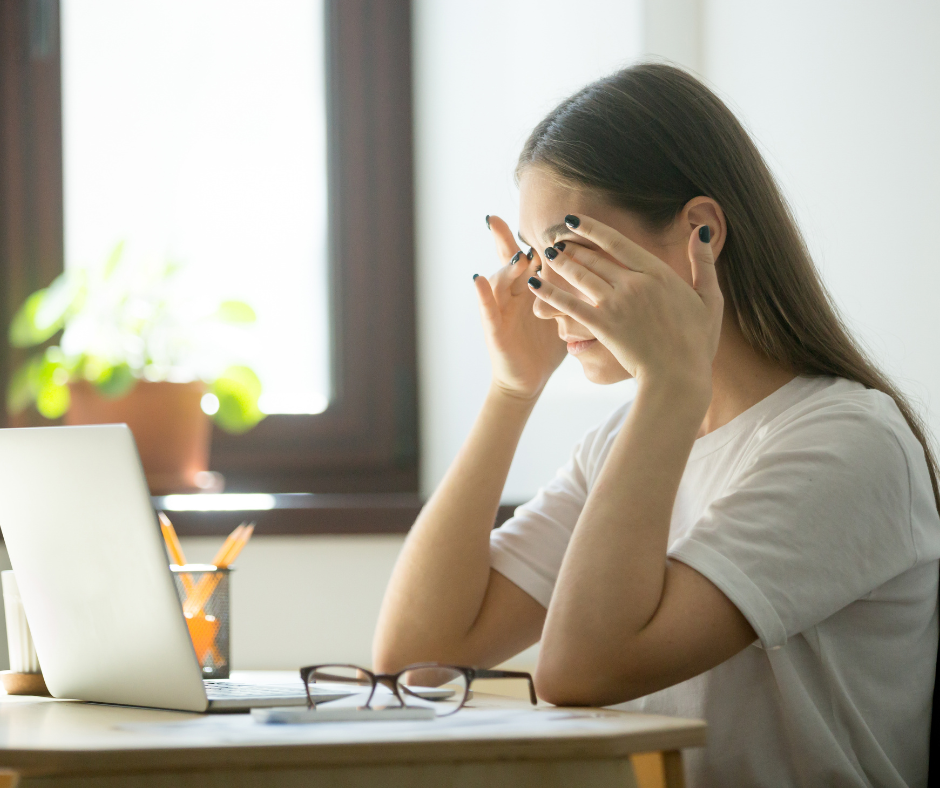
25 Aug 5 Ways to Prevent Fatigued Eyes
Over the past couple years, eye fatigue has become an increasingly common ailment. Luckily, while it can be uncomfortable, eye fatigue is not a serious eye condition, and can be treated mainly with lifestyle changes. But how do you know if your eyes are fatigued? Eye fatigue could cause headaches, difficulty concentrating, or even muscle pain or stiffness in the upper body.
Whether or not you experience these symptoms, your eyes will still be affected; fatigue can cause blurry vision, itchy or burning eyes, or extremely dry or watery eyes. You may also experience increased sensitivity to light.. You are at greater risk of eye fatigue if you spend large amounts of time focused on a single activity, such as working at a computer, as are children who spend significant time on digital devices. If this sounds familiar, you may be suffering from eye fatigue. Continue reading for 5 ways to prevent your eyes from feeling fatigued.
1. Adjust Lighting
The first way to prevent fatigued eyes is to ensure you are in a properly lit space. An inadequately lit environment—whether it be too dim or too bright—can cause eye strain and fatigue. Further, the position of your lighting can have an impact on your eyes’ performance. If you are doing focus-intensive work, such as reading, position the light behind you to provide the best lighting. If you are watching TV, dimming the lights could help to reduce eye strain.
Electronics can be especially tiresome for your eyes. If you are viewing a screen, adjust its brightness to properly reflect your environment. Additionally, shade windows or use light filters to reduce glare on digital devices, TVs, and computer screens. By providing your eyes with proper lighting, you will most likely avoid the symptoms of eye fatigue.
2. Use Artificial Tears
Another way your eyes can become fatigued is by not receiving adequate lubrication. Intense focus can result in a reduction of the times you blink per minute, especially when you are viewing a screen. When you blink less, your eyes can become dry and irritated, causing fatigue. To address this, use artificial tears. However, you should also try to modify this behaviour by trying to blink more frequently and fully, especially while you are concentrating on a task.
3. Take Breaks
Eye fatigue can be caused by focusing on a single task for a long period of time, such as driving, reading, completing detail work such as sewing, or using a screen. Reducing the time that you’re exposed to a single activity requiring intense focus will help to prevent eye fatigue. Take breaks, walk around, and stretch your muscles to help yourself relax—your eyes will appreciate the change in environment.
If you need to remain focused on a task for a long period of time, it is still important that you give your eyes breaks. If you cannot take a proper break—for example, if you are at work on your computer—try multitasking using different mediums to let your eyes rest. Switch to a task you can complete on paper, rather than completing it on your computer. Even a short break will help… all you need is 20 seconds! Follow the 20:20:20 rule, and every 20 minutes look at something 20 feet away, for 20 seconds. This will allow your eyes to refocus and rest before you return to your task.
4. Get a Good Rest
Feeling stressed or tired can also cause eye fatigue. Getting adequate sleep is important for your entire body, including your eyes. When you sleep, your eyes are flushed of old cells and proteins, allowing for new ones to grow and develop—they are literally refreshed! Your tear ducts also help to clean and renew your eyes during a deep sleep. You should have at least 6-8 hours of sleep per night, so your eyes can rest and refresh properly, avoiding eye fatigue.
5. Choose the Proper Eye Wear
If you are experiencing prolonged eye fatigue, you should work with your eye doctor to determine if you require special eyewear to reduce your eye strain. Specialized lenses, devices, or eye therapy for the activity causing the strain could be prescribed by your eye doctor. Additionally, they could suggest certain coloured or tinted lenses be worn to help with eye strain, or that you reduce contact lens wear time to allow your eyes to rest. Your eye doctor is best equipped to determine the cause of your eye fatigue and can help determine a solution that suits your eyes and your lifestyle.
To remedy eye fatigue, you will likely only need to make these lifestyle changes. However, if you are experiencing severe eye fatigue, it is especially important that it be discussed with your eye doctor. This could be an indication that you need specialized eyewear, or that your fatigue is a symptom of a more serious condition. Be aware of the signs and symptoms of eye fatigue, and you will be best able to prevent it! The optometrists at Dr D’Orio Eyecare are committed to your eye health and will help you determine the best course to treat your eye fatigue. To book an appointment today, visit https://drdorioeyecare.com/book-appointment/ or call us at 416 656 2020 for our Toronto location, or 416 661 5555 for our North York location.


